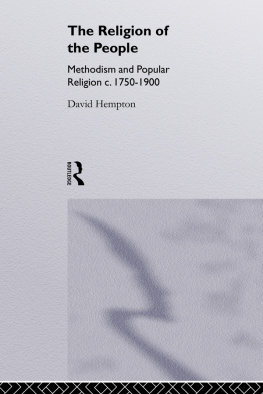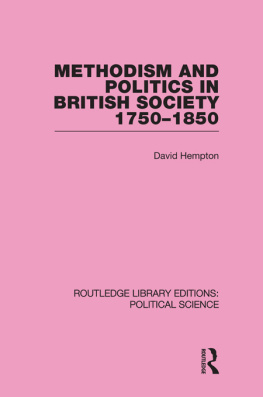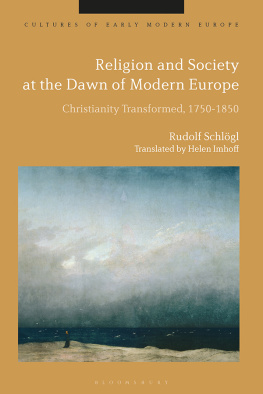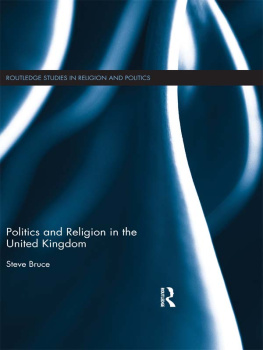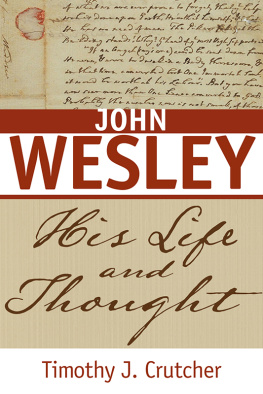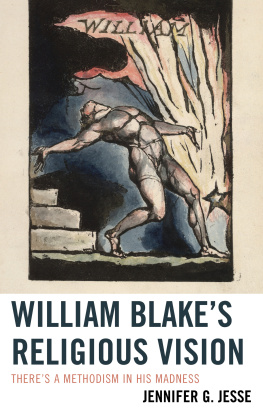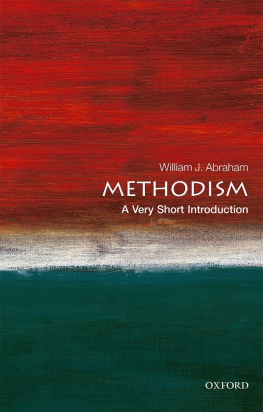THE RELIGION OF THE PEOPLE
Methodism was the most important religious movement in the English-speaking world in the eighteenth and nineteenth centuries. It helped reshape the old denominational order in the British Isles and North America and deeply affected the lives of many millions of people.
Although taking account of broader patterns of growth, the focus of this book is Methodism in the British Isles in the period 17501900. David Hempton begins with a discussion of why Methodism grew when and where it did and what was the nature of the Methodist experience for those who embraced it. The distinctive religious beliefs and practices of Methodism appealed mostly to women and men of the lower middle and working classes, and its harsh disciplines and tender pieties have been closely related to many other important questions such as class formation, increased political consciousness, the rise of industrial capitalism and market economies and the growth of religious pluralism.
Hempton considers four of the important figures in the early history of Methodism: John Wesley, the founder; Jabez Bunting, the most powerful man in the connexion in the nineteenth century; Thomas Allan, the connexional lawyer and political adviser; and Gideon Ouseley, a representative of the much neglected order of itinerant preachers who spread the Methodist message. The Religion of the People concludes with an exploration of the themes of law, politics and gender which lie at the heart of Methodist influence on individuals, communities and social structures.
David Hempton is Professor of Modern History in the Queens University of Belfast. He is the author Methodism and Politics in British Society 17501850 (1984) and co-author of Evangelical Protestantism in Ulster Society 17401890 (1992).
This lively and highly readable cluster of essays takes the reader to the heart of recent debates over popular religion (especially popular Protestantism). It offers not only the ripe fruits of the authors work but along the way provides a critical synthesis of much recent research by others. The tone is refreshingly fairminded: Hempton avoids both the clichs of the old denominational history and the reductionism of some modern writing on the social role of religion. An important book.
John Walsh,
Jesus College, Oxford
The Religion of the People is an extraordinarily good book distinguished for the lucid complexity of its arguments as well as for its compelling use of wide-ranging sources. This is historical writing at its best.
Mark A. Noll,
Wheaton College, Illinois
Those who want the latest word on Methodisms first century can do no better than turn to this collection of essays by David Hempton. A pleasure to read.
Hugh McLeod,
University of Birmingham
THE RELIGION OF THE PEOPLE
Methodism and popular religion c. 17501900
David Hempton
First published 1996
by Routledge
11 New Fetter Lane, London EC4P 4EE
Simultaneously published in the USA and Canada
by Routledge
29 West 35th Street, New York, NY 10001
Routledge is an imprint of the Taylor & Francis Group
1996 David Hempton
All rights reserved. No part of this book may be reprinted or reproduced or utilized in any form or by any electronic, mechanical, or other means, now known or hereafter invented, including photocopying and recording, or in any information storage or retrieval system, without permission in writing from the publishers.
British Library Cataloguing in Publication Data
A catalogue record for this book is available from the British Library
Library of Congress Cataloguing in Publication Data
Hempton, David
The religion of the people: Methodism and popular religion c. 17501900 / David Hempton.
p. cm.
Includes bibliographical references and index.
1. Methodist ChurchGreat BritainHistory18th century.
2. Methodist ChurchGreat BritainHistory19th century.
3. Great BritainReligious life and customs.
4. Great BritainChurch history18th century.
5. Great BritainChurch history19th century.
I. Title.
BX8276.H47 1996
287.094109033dc20 9532861
CIP
ISBN 0415077141
For Reg Ward and John Walsh
This book has been a decade in the making and had its origins in the immediate post-completion depression of Methodism and Politics in British Society 17501850 (London, 1984) in 1983. As is the way with historians, I was struck more by the questions I had failed to address than the ones I had tried to answer. Each of the ten chapters in this book, therefore, represents an attempt to answer a specific question, grouped around three overarching categories of growth, people and themes.
With so much of the historiography of English Methodism encaged within the little Englander tradition of scholarship, the question at the heart of is how was it that a religious movement with broadly similar theological content and organizational structures had such different patterns of growth, not only within England, but right across the North Atlantic world in the Age of Revolution? Moreover, an appreciation that Methodist growth was yet more spectacular in the USA than in England further erodes the attempts that were made to explain such growth purely within the peculiarities of English economic and social history. Methodism, in short, was an international religious movement (with roots in European pietism and with branches all over the world), not an English epiphenomenon.
Methodist growth needs also to be earthed in the specificities of time and place. represents a progress report on a lifetime mission to penetrate to the heart of popular religion in the modern period. The immediate stimulus on this occasion was the conviction that the picture of popular religion that emerged from Victorian novels and oral evidence was not the same as the one presented in the great statistical surveys so beloved by middle-class Victorians. I have also made an effort in this chapter to bring the situation up to date by referring to some fresh work in the field.
has to do with people, and the questions addressed have to do with the quality of the surviving evidence which is unusually lavish for all four biographical portraits. My chapter on Wesley is an attempt to get to the heart of his political theology by looking at his attitudes towards those four cornerstones of the eighteenth-century state: monarchy and constitution, Established Church, property and law. The purpose of the chapter on Bunting is not to heap more abuse on this most abused of ecclesiastical bureaucrats (though that was very tempting), but, through a close reading of all his surviving correspondence, to understand the processes by which this son of a radical Manchester tailor forsook his early career as a Methodist revivalist for the trappings of connexional power. Moreover, Bunting should not be seen in isolation from the forces unleashed on the religious world by the French and Industrial Revolutions. The peculiar relationship between power and piety worked out in the solid, mathematical mind of Jabez Bunting was worked out in thousands of different ways in the Methodist circuits of early industrial England. Jabez Buntings deformity of the sensibility, to use Edward Thompsons characteristic phrase, may have been particularly odious, but the processes that produced it were not unique to him.

